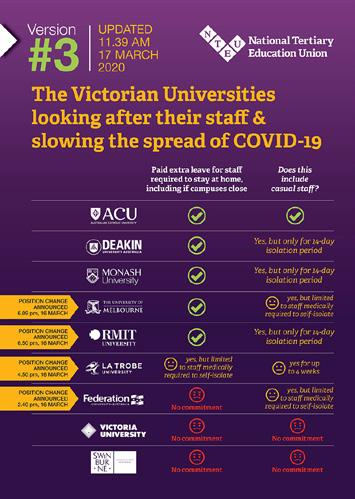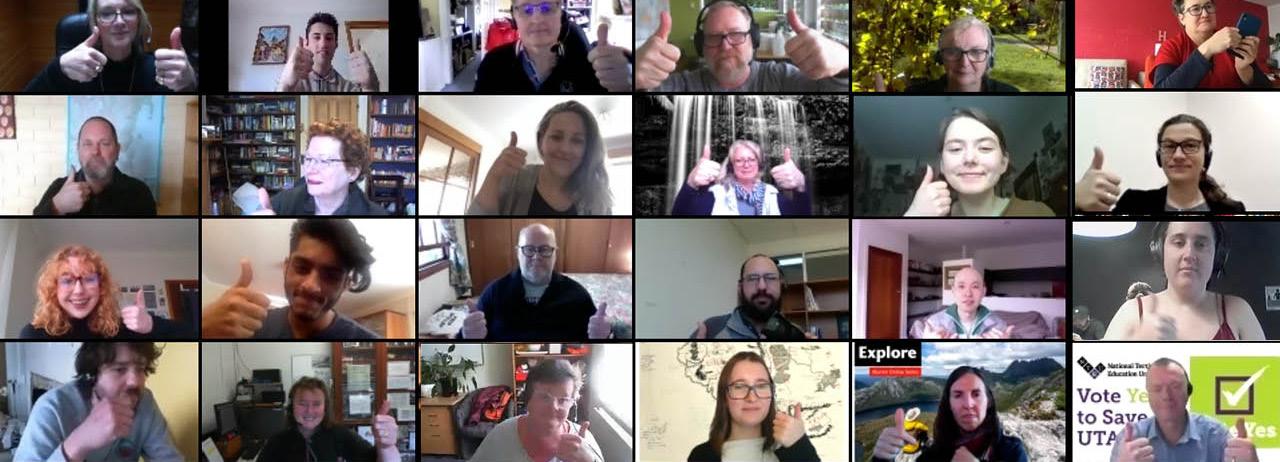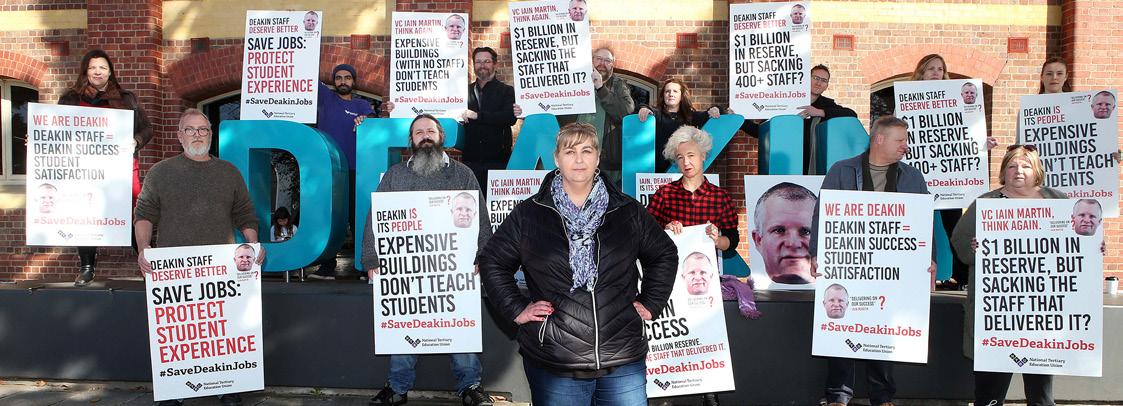
5 minute read
Vic Division
from NTEU Annual Report 2019-2020
by NTEU
Victorian Division
www.nteu.org.au/vic
Advertisement
Division Officers Victorian Division Secretary: Mel Slee Division Asst Secretary: Sarah Roberts Division President: Mark Shier Division Vice-Presidents: Christian Haesemeyer (Academic), Cathy Rojas (General)
Division Staff Senior Industrial Officer: Linda Gale Division Industrial Officers: Joe Nunweek, Rob Binnie, Clare Danaher, Margaret Maloney, Serena O’Meley, Corey Rabaut, Rhidian Thomas Division Industrial Organisers: Janet Bourke, Jesse Page, Linda Cargill, Lisbeth Latham, Colin Muir, Garry Ryan Senior State Organiser: Chloe Gaul Division Organisers: Aimee Hulbert, Simon Linskill, David Willis, Rifai Abdul, Frank Gafa, Roberta Stewart, Amelia Sully (on parental leave), Cal Parsons (parental leave appointment), Ben Kunkler, Trevor Miller Campaigns & Communications Officer: Toby Cotton Admin Officer/Executive Support: Adrienne Bradley The Victorian Division represents over 10,600 members at nine public universities: Deakin University, Federation University Australia (FUA), La Trobe University, University of Melbourne, Monash University, RMIT University, Swinburne University, Victoria University (VU) and two campuses of Australian Catholic University (ACU) and many TAFE sites and smaller education providers, such as William Angliss and Navitas. It is safe to say 2020 has been challenging, particularly in the Victorian Division where the state has been in prolonged lockdown. Nonetheless, the Victorian Division has continued its focus on organising – remotely as required! The Division is dedicated to building our organising capacity through grassroots campaigns, identifying and training new delegates and membership growth.
Recruitment & Membership, Training and Development The Division has resourced its strategy of building organising capacity by increasing its organising team. Following a major change process, one outgoing Industrial Officer was replaced with an Organiser. The Division also experimented with appointing Member Organisers and successfully appointed one of those Member Organisers to an ongoing Organiser role. However, there was discomfort with appointing staff on insecure contracts. This approach has therefore been abandoned. The Division has also invested considerable resources in formal training and development for our organising team through the Australian Trade Union Institute. In turn, the Organising team has conducted regular training sessions for delegates and members in organising, recruitment and campaigning. With the advent of COVID-19, these sessions were successfully moved online. The Division has also hosted online talks and seminars of general interest to the membership.
COVID-19 The advent of the pandemic and its devastating impacts on student enrolment and in turn university finances put the Division under considerable pressure as we campaigned for a government support package and against redundancies and aggressive management cost-cutting measures.
Campaigning for a government rescue package Despite being in lockdown, Victorian Division worked closely with the National Office to deliver a number of very successful National Days of Action to demand the Scott Morrison Government extend JobKeeper to the university sector and fill the more than $4.5 billion shortfall.
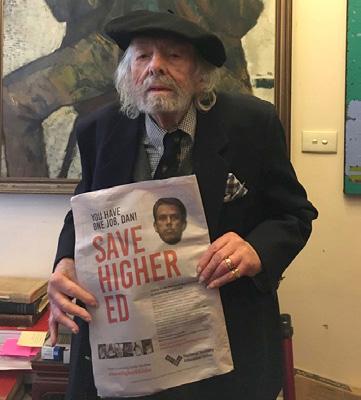
media campaign which saw the NTEU’s hashtag of SaveHigherEdJobs trend second in Victoria (after COVID-19, of course). The failure of the Federal Government to defend the sector saw the NTEU focus on the Branches to prevent senior managements from forcing staff to bear the brunt of the funding shortfall.
Melbourne Uni The University of Melbourne Branch successfully mobilised members to defeat a non-union ballot. 64% of all staff voted “NO” to reject management’s proposal to vary their Enterprise Agreement. The proposal would have seen a pay cut of 2.2% without any enforceable guarantees on job security. Management withdrew from national negotiations with the NTEU to pursue a variation that would avoid scrutiny and financial transparency. During an online meeting with the biggest turnout in a generation, NTEU members voted 97% to launch the Vote No campaign. In a huge mobilisation effort over the course of two weeks, members, delegates and NTEU staff spoke to over 2000 people in open meetings across all faculties. Volunteers from the membership and NTEU staff with support from staff in the ACTU chipped in to make thousands of calls to bring out the vote.
Monash Monash NTEU Branch successfully secured a Jobs Protection Framework in line with the NTEU’s national COVID-19 strategy. 83.6% of NTEU members at Monash voted in favour of the framework and 89.3% of all Monash staff subsequently endorsed the approach. Up to 140 staff joined the NTEU in the fortnight leading up to the NTEU ballot. Using the framework, the NTEU was able to save fixed term and casual jobs and campaigned to secure up to one day per week of paid carer’s leave for home-schooling parents (ACU and La Trobe secured similar outcomes for carers). The Monash NTEU Branch met workplace by workplace to ensure a fair and reasonable approach to voluntary redundancies. There
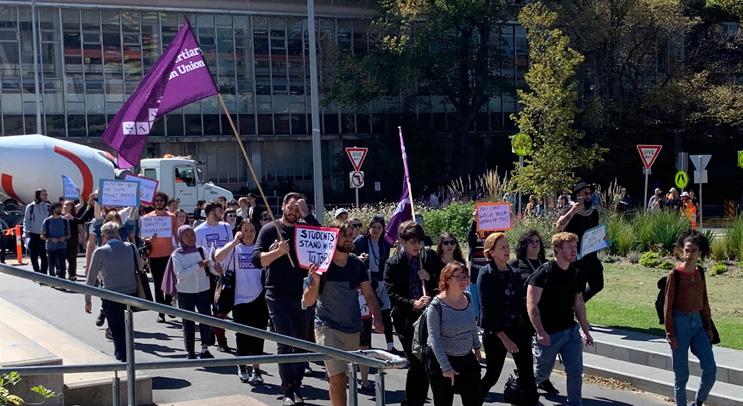
were no involuntary redundancies. Monash Branch continues to grow.
La Trobe The NTEU secured a Jobs Protections Framework at La Trobe. However, La Trobe University continues to struggle financially and recently announced 400 redundancies.
Mass redundancies Managements at Deakin and RMIT were the most aggressive in pursuing mass redundancies in response to the pandemic. Deakin university was the first to pursue 400 forced redundancies with no option for voluntary redundancies. It was accompanied by a major restructure of the campus. NTEU successfully prosecuted Deakin management in the Fair Work Commission for their failure to appropriately consult with the NTEU and staff. Unfortunately, improved consultation did not abate management’s plans. Meanwhile, RMIT lost 355 staff in voluntary redundancies and then 345 in forced redundancies. A mix of voluntary and involuntary redundancies are planned for 190 jobs to go at VU. A voluntary round of redundancies is currently underway at Swinburne. Countless casuals and fixed term contract staff on all campuses did not have their contracts renewed.
COVID-safe workplaces Although staff and students have not returned to the campuses in Victoria, the NTEU has taken action to train our staff and in turn to train HSRs and delegates throughout the State via Victorian Trades Hall Council and the ACTU’s Australian Trade Union Institute. OH&S will continue to be an important focus for the Division.
Justice for casuals: Wage theft campaign The NTEU ensured that Melbourne Uni made headlines with its scandalous wage theft with around 1500 academic casuals owed millions of dollars in backpay. Casual academics were being paid around a half and a third of what they should have been paid including a piece rate system that saw casuals paid just three minutes to mark assessments. RMIT has also had some success in prosecuting unfair pay for casuals.
Coming out of this crisis, the Victorian Division will continue to fight for a university system built on reliable government funding and fair, secure jobs. The struggle continues! ◆
Images (this page): Retired member Patrick Hutchings #SaveHigherEd National Day of Action selfie, 21 May 2020; UniMelb casuals rally on campus demanding to be paid isolation sickleave so that they would not be forced to choose to go to work and spread #COVID-19, March 2020 (Toby Cotton); NTEU Victoria’s COVID-19 scorecard from 17 March 2020.
